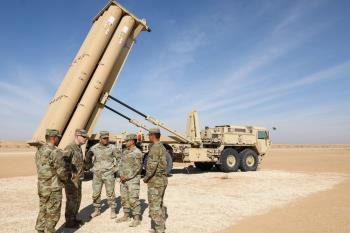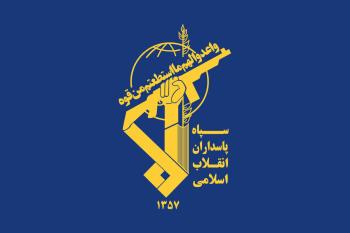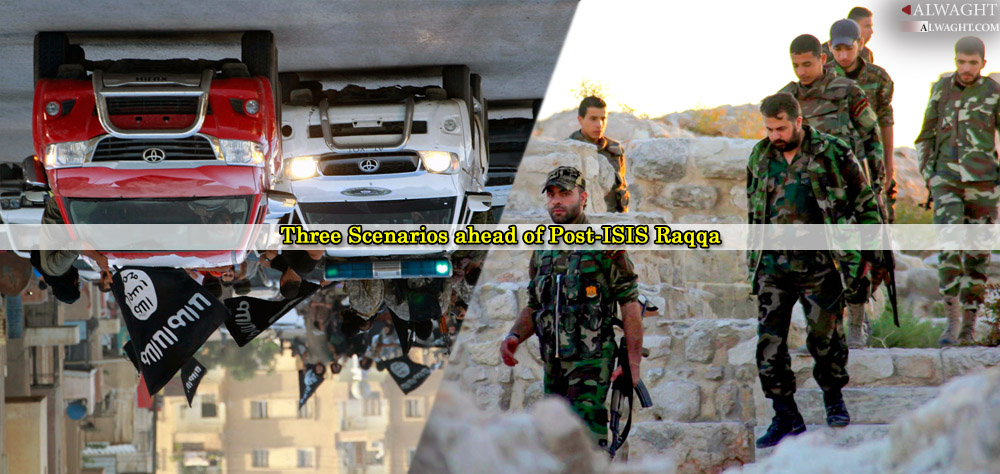Alwaght- With start of Raqqa recapture operation on May 21, by participation of about 25,000 of the Kurdish Syrian Democratic Forces and 500 American troops provided with the air cover from the US-led international military coalition, a series of speculations grew about the future of the ISIS-held Syrian city after liberation.
In the beginning, the odds were that the Syrian Democratic Forces, supported by the coalition's fighter jets, would recapture the city from ISIS in a short time in a speedy assault. But shortly later, it appeared that the analyses actually were made in haste.
Now it should be noted that the Kurdish forces only could liberate northern areas of Raqqa and not the center of the city.
It could be predicted that a full liberation operation of Raqqa takes at least one full month.
What this analysis focuses on is the scenarios for the stronghold of ISIS should the terror group is defeated and the Syrian Democratic Forces reclaim the city.
It must be noted that these scenarios are credible only if we assume that the city is taken back from ISIS.
With these considerations in mind, three scenarios could be seen for the future of ruling of Raqqa.
Becoming part of northern Syria federal system
The first and perhaps the most likely scenario is annexing Raqqa's territory to the Kurdish Kobani canton which is part of northern Syrian federal government- containing three cantons- announced by the Kurds.
The People's Protection Units (YPG) and the Women's Protection Units (YPJ)-both Kurdish-, which play the most significant role in the city liberation, possibly in the future would seize control of the majorly Arab-inhabited Raqqa to bring it under their autonomous federal system.
Gharib Hassu, the envoy of Democratic Union Party (PYD) to Iraq’s Kurdistan region, has said that after the retaking, Raqqa would be part of north Syria federal government. Hassu highlighted the point that the Syrian Democratic Forces would have the biggest role in liberation of the city from the terrorists, so, after the recapture process, the Kurds reserve the right be in control there.
Despite the fact that this is the most likely scenario for the post-ISIS Raqqa, without doubt the Kurdish forces would face an array of opposition and hurdles during their attempts to rule over the Arab-inhabited city. In fact, it is unbearable for the Arabs to go under the rule of the Kurds, who before the spark of crisis in the country in 2011 were not more than outcast and marginalized citizens. Internally, the Arabs of Syria would strongly come again rule of the Kurds over Raqqa. Regionally, the Arab states and Turkey would also reject takeover of the city by the Kurdish forces.
These Arab oppositions are considered as the major factors impeding a stable governing of Raqqa by the Kurds.
Raqqa in the hands of central Syrian government
Based on the battlefield happenings which are part of the country's wider general military developments, there is a principle that governs the equations of the battlegrounds. The principle is that when the military forces of any party seize control of an area, the specific party would become ruling force of the area. As long as it holds ground, no other forces could exercise influence in the area.
Accordingly, with a review of the record of Raqqa military developments, it could be suggested that in the short run, the central Syrian government would unlikely be capable of taking a role in Raqqa.
The Syrian government’s forces in June 2014 received a defeat from ISIS in Raqqa, allowing the city to fall to the terrorists. On June 29, 2014, the city was officially announced capital of the so-called Islamic caliphate in Syria. Following these events, the Syrian army made attempts to take the city back from ISIS, however, its efforts met with failure. Moreover, even now that Raqqa recapture operation is under way, the central Syrian government's forces are not taking part, and so it is very unlikely that administration of Raqqa be given to Damascus government after liberation.
The principal reality of the Syrian society, which is governed by an anarchic order, is that the territory belongs to the victorious forces on the ground and so the administration is in the hands of the forces with bold presence in the areas of battle. Thus, the scenario to hand over the rule of Raqqa to central Syrian government is completely at odds with the realities in Syria’s political scene.
Self-rule under UN watch
Another possible scenario for the post-ISIS Raqqa is that it goes under control of forces of the international coalition who would be under UN administration. But this scenario is of little likeliness because a wide range of foreign forces are now intervening in the Syrian crisis and so every one of them has its own stances on the embattled city after liberation.
Since the beginning of the Syrian crisis, no international power has majorly intervened in Syria through deploying large number of forces to the battlefields. Additionally, Staffan de Mistura, the UN special envoy to Syria, has failed to play an active role in crisis settlement process because there are deep gaps between the opposing sides in Syria, in the region and in the world.
Also, it must be taken into account that by sending forces to take part in Raqqa anti-terror assault, Washington seeks scoring a win in its name in the Syrian crisis.
So, the Syrian Democratic Forces- ally to the US and the most important force that has the backing of the Washington- could rise as the best choice of the White House to take over administration of Raqqa after liberation.



























